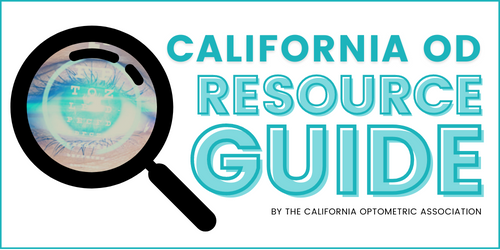If You Have Employees … More New Laws
A number of measures were signed into law that impact doctors of optometry as employers and their obligations to employees. Unless otherwise stated, the below new laws took effect January 1, 2017. As employment – and other - laws can be a complicated web for doctors of optometry to stay in compliance, COA launched in 2016 its new COA Legal Services Resource Program providing free access to an attorney to assist in navigating legal requirements.
AB 1843, Stone, D: Juvenile Convictions: Prohibits an employer from inquiring into an applicant's juvenile arrest or conviction history while under the jurisdiction of juvenile court law, and prohibits an employer from using those arrests or convictions as a factor in determining any condition of employment, including hiring, promotion and termination. Exceptions to this prohibition include instances when the employer is required by law to obtain information regarding a conviction of an applicant, an individual who has been convicted of a crime is prohibited by law from holding the position sought or the employer is prohibited by law from hiring an applicant who has been convicted of a crime.
AB 1847, Stone, D: Required Notice of California Earned Income Tax Credit.
Requires employers to annually notify employees of their potential eligibility for the California Earned Income Tax Credit, as specified.
AB 2337, Burke, D: Time Off for Victims of Domestic Violence, Sexual Assault, Stalking – Required Notice: Existing law permits employees who are victims of domestic violence, sexual assault and stalking to take time off for medical treatment or legal proceedings. This law requires employers to provide written notice to employees about those existing rights at the time of hire and upon request. This requirement shall not take effect until the California Labor Commissioner develops a notification form, which is required to be completed on or before July 1, 2017.
SB 3, Leno, D: Minimum Wage Increase: Gradually increases the California minimum wage to $15 per hour by imposing six annual increases for employees based on the size of the employer, as follows:
|
Date of Increase |
26 or more Employees |
25 or fewer Employees |
|
January 1, 2017 |
$10.50 |
|
|
January 1, 2018 |
$11 |
$10.50 |
|
January 1, 2019 |
$12 |
$11 |
|
January 1, 2020 |
$13 |
$12 |
|
January 1, 2021 |
$14 |
$13 |
|
January 1, 2022 |
$15 |
$14 |
|
January 1, 2023 |
|
$15 |
Please note that local minimum wage ordinances may have higher minimum wage requirements than the state. Additionally, employers need to post the new Minimum Wage Order (MW-2017) in the workplace. Finally, the increased minimum wage affects the minimum annual salary for exempt employees (employees who are exempt from overtime). The exempt employee minimum salary for employers of 26 or more will increase to $43,680 (equal to two times the minimum wage based on a 40 hour workweek) in 2017, but remain the same this year for employers with 25 or fewer employees ($41,600).
SB 1001, Mitchell, D: Employment Verification: Conforms state law to federal which prohibits an employer from requiring more than the federal Form I-9 process to verify an employee's eligibility to work, including prohibitions on refusing to accept documents that appear genuine on their face, reinvestigate or reverify an incumbent employee’s authorization to work, or to retaliate against that person for exercising a protected right. Violation of this law can lead to a fine of up to $10,000 and equitable relief for the employee. Note: The U.S. Citizenship and Immigration Services (USCIS) has issued a revised Form I-9, Employment Eligibility Verification, that must be used by all employers beginning January 22, 2017, for all new hires. See “Required New Hire I-9 Form Changes” in the December 2016 edition of this newsletter.
Proposition 64, The Control, Regulate and Tax Adult Use of Marijuana Act: This November 2016 ballot initiative legalizes recreational use of marijuana in California by individuals who are 21-years-of-age or older. However, employers can still enact and enforce workplace policies concerning marijuana. The law does not require employers to permit or accommodate the use of marijuana in the workplace, or affect the ability of employers to have workplace policies prohibiting the use of marijuana.
COA Legal Services Resource Program: To assist members in complying with the above new laws, as well as other legal requirements for operating an optometric practice, COA has made available access to an attorney at COA’s legal firm of Wilke Fleury at no cost for up to one-half hour (30 minutes) of telephone and research work per month. Simply call Wilke Fleury at 916-441-2430, provide your COA member number and ask for any of the three following attorneys: Steve Marmaduke for employment-related issues; or Daniel Baxter or William Gould for any other legal matters.
1.png)

1.png)



.png)




.png)
.png)
.png)
.jpg)
.png)
.png)
.png)
.png)
.png)
.png)

.png)

.png)
.png)
